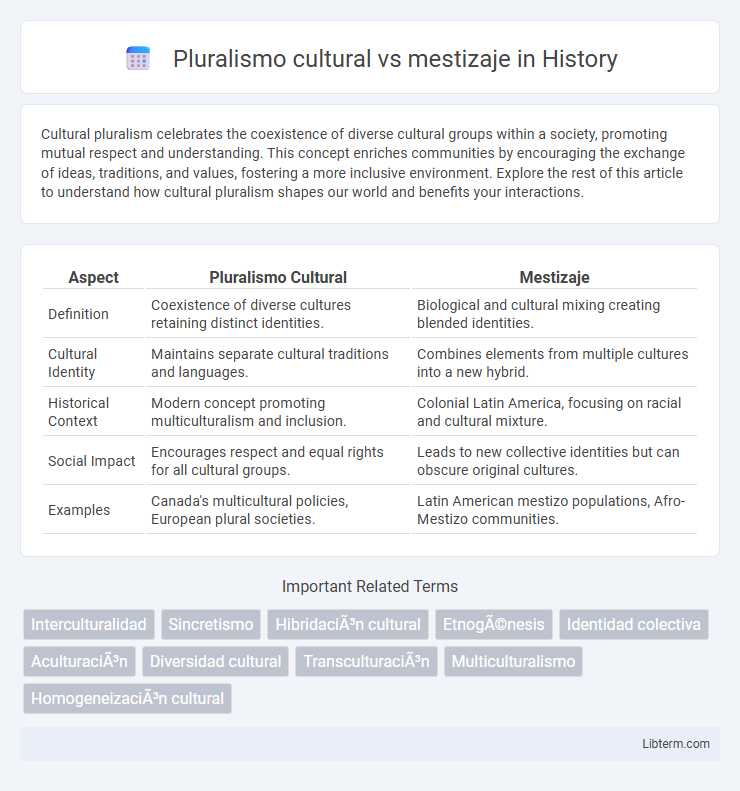Cultural pluralism celebrates the coexistence of diverse cultural groups within a society, promoting mutual respect and understanding. This concept enriches communities by encouraging the exchange of ideas, traditions, and values, fostering a more inclusive environment. Explore the rest of this article to understand how cultural pluralism shapes our world and benefits your interactions.
Table of Comparison
| Aspect | Pluralismo Cultural | Mestizaje |
|---|---|---|
| Definition | Coexistence of diverse cultures retaining distinct identities. | Biological and cultural mixing creating blended identities. |
| Cultural Identity | Maintains separate cultural traditions and languages. | Combines elements from multiple cultures into a new hybrid. |
| Historical Context | Modern concept promoting multiculturalism and inclusion. | Colonial Latin America, focusing on racial and cultural mixture. |
| Social Impact | Encourages respect and equal rights for all cultural groups. | Leads to new collective identities but can obscure original cultures. |
| Examples | Canada's multicultural policies, European plural societies. | Latin American mestizo populations, Afro-Mestizo communities. |
Introducción al pluralismo cultural y mestizaje
Pluralismo cultural acknowledges the coexistence of diverse cultural groups maintaining their unique identities within a society, promoting mutual respect and equal rights. Mestizaje refers to the blending of different cultures and ethnicities, often resulting in a hybrid identity that reflects mixed heritage. Both concepts highlight ways societies address cultural diversity, with pluralismo emphasizing preservation and mestizaje focusing on integration and fusion.
Definiciones clave: Pluralismo cultural y mestizaje
Cultural pluralism refers to the coexistence of diverse cultural groups within a society, each maintaining their distinct traditions, languages, and identities. Mestizaje is the process of racial and cultural mixing, especially between Indigenous peoples and Europeans, resulting in new hybrid identities and cultural expressions. Both concepts address diversity but differ as pluralism emphasizes preservation of unique cultures, while mestizaje highlights fusion and integration.
Orígenes históricos del mestizaje
Mestizaje originated from the historical mixing of Indigenous American, European, and African populations during the colonial period in Latin America, resulting in a complex ethnic and cultural blending. This process was driven by colonization, intermarriage, and social policies that promoted a mestizo identity as a national ideal in many countries. Pluralismo cultural, by contrast, values the coexistence and recognition of diverse ethnic groups and cultures without emphasizing racial or cultural mixing.
El pluralismo cultural en la teoría social
El pluralismo cultural en la teoria social sostiene que diversas culturas coexisten de manera autonoma dentro de una sociedad, promoviendo el respeto y la valorizacion de diferencias etnicas, linguisticas y religiosas. Este enfoque enfatiza la preservacion de identidades culturales especificas frente a la homogeneizacion, contrastando con el mestizaje, que implica la mezcla y fusion de elementos culturales para crear nuevas identidades hibridas. La teoria social del pluralismo cultural contribuye a politicas de multiculturalismo y reconocimiento legal de grupos indigenas y minoritarios, fortaleciendo la inclusion y la diversidad social.
Diferencias fundamentales entre pluralismo y mestizaje
Pluralismo cultural promotes the coexistence and preservation of diverse ethnic identities within a society, emphasizing respect and equality among distinct cultural groups. Mestizaje refers to the biological and cultural mixing of different races and ethnicities, leading to a blended identity that often diminishes original cultural distinctions. The fundamental difference lies in pluralismo valuing diversity as distinct entities, while mestizaje focuses on fusion and hybridization of cultures.
Impacto del mestizaje en la identidad nacional
El mestizaje ha transformado la identidad nacional al fusionar diversas herencias culturales en una sintesis unica, favoreciendo una identidad hibrida que refleja la diversidad historica de un pais. Este proceso ha generado un sentido de pertenencia inclusivo, aunque a veces diluye las particularidades culturales originales, contraponiendose al pluralismo cultural que promueve la coexistencia respetuosa de identidades separadas. El impacto del mestizaje se evidencia en la riqueza cultural, la diversidad linguistica y las expresiones artisticas que definen la nacion, moldeando una identidad nacional dinamica y en constante evolucion.
Ventajas y desafíos del pluralismo cultural
El pluralismo cultural promueve la convivencia y el respeto entre diversas identidades culturales, fortaleciendo la diversidad social y enriqueciendo las perspectivas colectivas. Este enfoque enfrenta desafios como la gestion de conflictos interculturales y la necesidad de politicas inclusivas que eviten la marginalizacion. La capacidad de integrar pluralidad cultural sin diluir identidades especificas es clave para consolidar sociedades justas y equitativas.
Dinámicas sociales: Convivencia vs integración
Pluralismo cultural promotes convivencia by encouraging the coexistence of diverse cultural groups maintaining distinct identities, fostering mutual respect and social harmony. Mestizaje emphasizes integracion through blending cultural traits into a unified national identity, facilitating social cohesion but potentially diminishing cultural distinctiveness. Social dynamics in pluralismo cultural highlight preserving diversity within a shared space, whereas mestizaje centers on creating a collective identity from cultural fusion.
Políticas públicas: Fomentando pluralismo o mestizaje
Public policies fostering pluralismo cultural emphasize the recognition and preservation of diverse ethnic identities, promoting inclusive education and legal frameworks that protect minority languages and traditions. In contrast, policies favoring mestizaje aim to blend cultural differences into a unified national identity, often prioritizing social cohesion over distinct cultural expressions. These contrasting approaches impact social integration strategies, resource allocation, and the representation of indigenous and Afro-descendant communities in Latin American countries.
Retos contemporáneos y perspectivas futuras
Cultural pluralism challenges mestizaje by emphasizing the preservation of distinct ethnic identities amid globalization and migration pressures. Contemporary challenges include addressing systemic inequalities and fostering intercultural dialogue to prevent cultural homogenization. Future perspectives prioritize policies that balance multicultural coexistence with social integration, promoting equity and cultural recognition within diverse societies.
Pluralismo cultural Infographic

 libterm.com
libterm.com